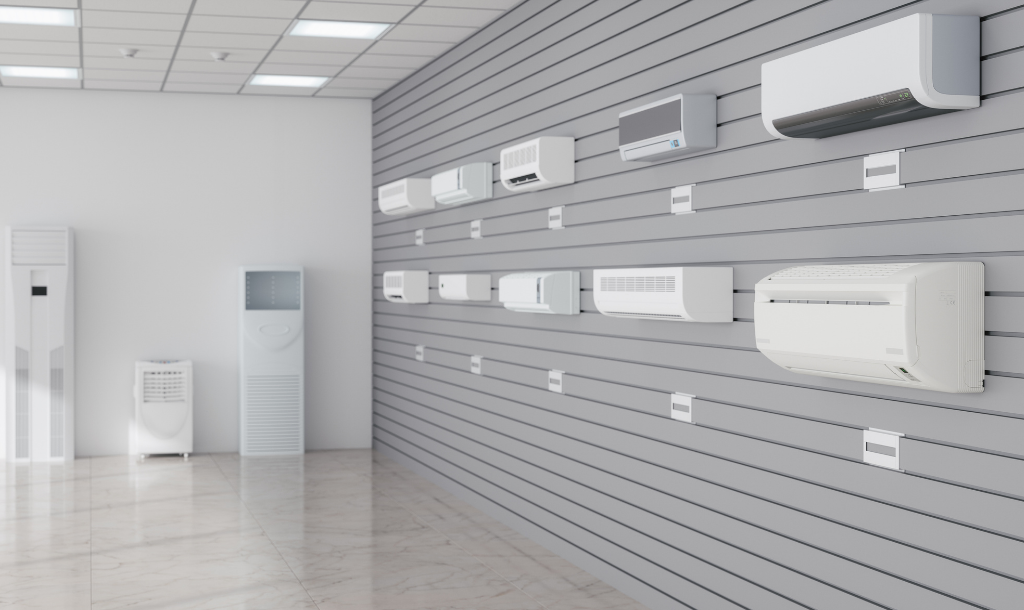
In the scorching heat of summer, types of air conditioners have become an indispensable part of our lives, providing a sanctuary of cool and comfortable indoor spaces. As technology advances, the options for cooling our homes and offices have expanded, offering a range of choices to cater to different needs and preferences.
In this article, we will delve into the world of air conditioning and explore 8 types of air conditioners, each with its own set of pros and cons.
Central Air Conditioning Systems
One of the most common types of air conditioners found in larger homes and commercial spaces is the central air conditioning system. These systems operate by cooling air at a central location and distributing it through ducts to various rooms. The advantages of central air conditioning systems are numerous. They provide efficient cooling for substantial spaces, ensuring a consistent temperature throughout. Moreover, they often incorporate advanced filtration systems that contribute to improved indoor air quality, making them a preferred choice for those with respiratory concerns.
However, central air conditioning systems come with their share of drawbacks. The installation and maintenance costs can be quite high, involving not only the system itself but also the ductwork that needs to be properly maintained. Furthermore, these systems consume a significant amount of energy, especially when cooling an entire house, which can lead to higher utility bills.
Window Air Conditioners
When it comes to cooling individual rooms or smaller spaces, window air conditioners are a popular option. These types of air conditioners are mounted on windows or specially designed openings in walls. They are known for their affordability, making them a convenient choice for those on a budget. Installation is relatively simple, as they don’t require intricate setup procedures.
Nonetheless, window air conditioners do have their limitations. Their cooling capacity is often limited, which might not be sufficient for larger rooms or open-concept spaces. Additionally, their installation can block windows and obstruct natural light, impacting aesthetics and views. Furthermore, some models can generate noise and might not be as energy-efficient as other alternatives.
Split (Ductless) Air Conditioners
Split air conditioners, also known as ductless systems, provide an alternative to central air conditioning, offering zoned cooling for specific rooms or areas. These systems consist of an indoor unit and an outdoor compressor unit connected by a conduit. The benefits of split air conditioners include their energy-efficient operation and the fact that they do not require ductwork, which can sometimes be a maintenance challenge in central systems.
On the flip side, split air conditioners do come with certain downsides. The initial cost of purchasing and installing them can be higher than that of window units. Professional installation is also necessary to ensure optimal performance. Additionally, both the indoor and outdoor units require regular maintenance to keep them running smoothly.
Portable Air Conditioners
For those seeking versatility and mobility, portable air conditioners offer a practical solution. These units are compact and come with wheels, allowing them to be easily moved from room to room. They don’t require permanent installation and can be a great option for renters.
However, portable air conditioners have their limitations. Their cooling power might not be sufficient for larger spaces, and they can struggle to maintain lower temperatures in very hot climates. Additionally, these units can be noisy, which could be a concern for light sleepers. Furthermore, their energy efficiency can vary, so careful consideration is needed when choosing a model.
Evaporative (Swamp) Coolers
In arid regions, evaporative coolers, often referred to as swamp coolers, offer an energy-efficient and eco-friendly way of cooling indoor spaces. These types of air conditioners work by evaporating water to lower the temperature of the air, making them particularly effective in dry climates. They also add humidity to the air, which can be beneficial in areas where the air is extremely dry.
However, evaporative coolers are not suitable for all environments. They work best in dry climates and may not be as effective in more humid regions. Additionally, they provide localized cooling and might not be able to cool larger spaces effectively. Regular maintenance and a constant supply of water are also essential to ensure their proper functioning.
Geothermal Heat Pumps
Geothermal heat pumps are a highly efficient and environmentally friendly option for both cooling and heating. These systems utilize the stable temperature of the ground to provide year-round comfort. By tapping into the earth’s natural heat, they can significantly reduce energy consumption and greenhouse gas emissions.
Yet, geothermal heat pumps come with certain challenges. The initial investment required for installation can be substantial, and not all locations are suitable for this type of system due to geological factors. Professional installation and regular maintenance are crucial for optimal performance, adding to the overall cost.
Mini-Split Air Conditioners
Mini-split air conditioners, similar to split systems, offer zoned cooling and heating capabilities, but they are even more versatile in terms of installation. These systems consist of compact indoor units connected to an outdoor compressor. They provide efficient cooling while allowing for flexible placement of the indoor units.
On the downside, mini-split air conditioners can have a higher upfront cost compared to other types of air conditioners. Professional installation is recommended to ensure proper functioning, which can add to the overall expense. Regular maintenance is also necessary to keep these units running efficiently.
Hybrid Air Conditioners
Hybrid air conditioners combine conventional cooling methods with advanced technology to provide an energy-efficient solution. These systems can switch between traditional HVAC operation and electrically-driven or fuel-driven modes, optimizing efficiency based on external conditions.
Nonetheless, hybrid air conditioners have their own considerations. The initial investment can be higher due to the incorporation of smart technology and the capability to switch between different modes. Additionally, these systems might not be widely available in all markets. Furthermore, their efficiency relies on both electricity and other fuel sources, which can impact long-term operating costs.
The Cooling Maze – Make Informed Choices Among Diverse Air Conditioning Solutions
In conclusion, choosing the right type of air conditioner is crucial for ensuring comfort while considering factors such as cooling needs, budget, and environmental concerns. The various types of air conditioners discussed in this article offer a range of options to cater to different preferences and requirements. From central systems to portable units, each type comes with its own set of advantages and disadvantages. By understanding the pros and cons of each, individuals can make informed decisions and create a cool haven in the midst of even the hottest summer days.



